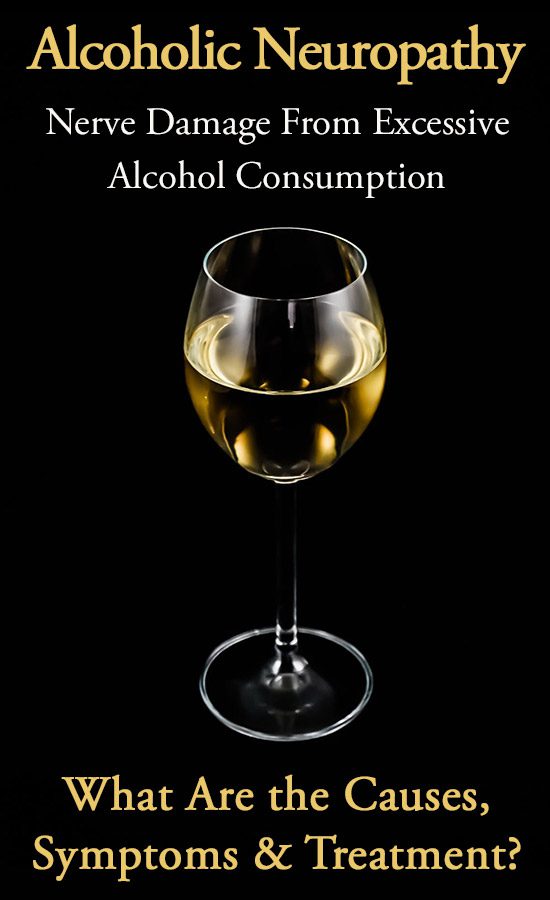Excessive, long-term alcohol consumption can lead to alcoholic neuropathy, a condition that damages peripheral nerves that send signals between the brain, spinal cord, and the rest of the body.
Alcoholic neuropathy is one of the most common and undiagnosed conditions among chronic drinkers.
Research suggests it affects up to 66 percent of patients suffering from alcohol dependency or alcoholism, although it is difficult to know for sure because there is no specific test to diagnose the disease.
It is also important to note that some heavy drinkers develop the condition much faster than others. This might be due to a predisposition to neuropathy, though experts are not entirely certain.

What Causes Alcoholic Neuropathy?
Consuming excessive amounts of alcohol over an extended period of time depletes the body of necessary nutrients, such as:
- Niacin
- Folate
- Thiamine
- Vitamin B6
- Vitamin B12
Drinking too much alcohol, or too frequently also damages organs like the kidney, liver and stomach that play a key role in filtering toxins out of the body.
The combination of a lack of nutrients and the body’s decreased ability to flush toxins creates a number of negative health effects.
Peripheral neuropathy from alcohol progressively erodes the coating that protects the nerves and damages the microscopic projections, known as axons, which transmit signals from one nerve to another.
The result is a spectrum of uncomfortable, painful, and even debilitating symptoms that can seriously diminish a person’s quality of life.
What Are Common Symptoms of Alcoholic Neuropathy?
Broadly, the symptoms of alcoholic neuropathy can cause pain and hypersensitivity, a decrease in the sensation that may lead to further injury and lead to degenerative mobility issues.
Some of these most common symptoms of alcohol nerve damage may include any of the following:
- Numbness, tingling or burning in the arms and legs
- Muscle atrophy, weakness, and spasms in the arms and legs
- An overall loss of muscle function in the limbs
- Decreased sensation in the hands and feet may result in physical injuries that may go unnoticed and are usually untreated
- The lack of pain may also lead to a great risk for infection as a result of unnoticed wounds
- Incontinence, constipation or diarrhea, as well as difficulty, urinating
- Sexual dysfunction and impotence
- Problems with balance and coordination
- Hypersensitivity and pain are most commonly in the fingers and toes, as well as the hands and feet
How is Alcoholic Neuropathy Treated?
Because there is no single test that can definitively pinpoint alcoholic neuropathy, diagnoses usually require a physician to consider a person’s medical history, perform blood and nerve tests, as well as determine if a patient struggles with alcohol dependency or alcoholism.
The first step in treating alcoholic neuropathy is addressing alcohol dependency or alcoholism.
For some patients, rehab in either an inpatient or outpatient treatment program may be required for them to stop drinking.
While there might be some improvement in symptoms once a person is living an alcohol-free lifestyle, the nerve damage caused by the neuropathy is often permanent but not always, especially if treated in time.
After diagnosis and examination, physicians generally prescribe various medications in an effort to manage or treat the symptoms.
Alcoholic Neuropathy Treatment Usually Includes Some of the Following
- Prescription painkillers or medications to treat neuropathy such as Gabapentin
- Anti-depressants and anti-seizure medications are both used off-label, as a way to manage pain
- Vitamin supplements to replace depleted resources
- Medication to help with urination
- Physical therapy and exercise to treat weak and atrophied muscles
- If necessary, orthopedic gear, such as leg braces, to help stabilize the limbs
The most effective way to avoid alcoholic neuropathy is to avoid alcohol entirely.
Early intervention and treatment for an alcohol use disorder may help prevent a person from developing this disease.
Therapies, such as cognitive behavior therapy (CBT), one-on-one counseling and medication-assisted treatment are proven, evidence-based approaches to helping people overcome an addiction to alcohol.
Related:
Dry Drunk Syndrome: Sobriety Without the Relief of Recovery
What are Common Wet Brain Symptoms of Korsakoff Syndrome?





